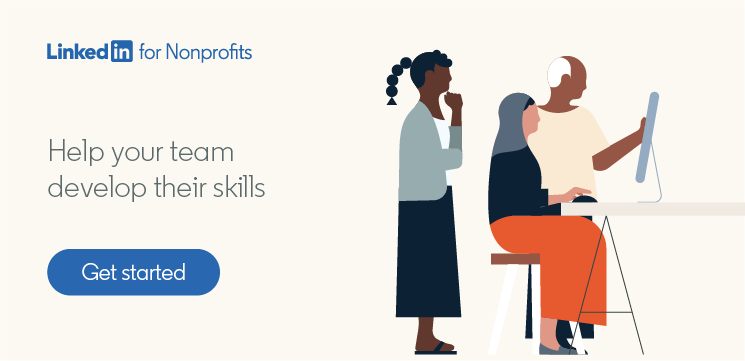
The Biggest Trends for 2021—and Free Courses to Help Nonprofits Get Ahead
Over the past year, nearly every aspect of our personal and professional lives has been uprooted. We've created new routines, adapted to uncertainty, and built resilience.
This shakeup means that virtual connection has become a part of everyone's lives and managers and leaders have been pushed to find new ways to motivate their teams. We’ve also seen professionals invest more in their own development; in fact, in the first week of April 2020 alone, people spent 3x more time engaging with LinkedIn Learning content than they did in the first week of January of that year.
To help you prepare for the weeks and months to come, we’ve compiled a list of some of the biggest trends expected to impact organizations this year—along with some free learning resources and actionable insights from expert instructors to help you make 2021 a fruitful year for your nonprofit team.
1. For nonprofit leaders, character will be everything
As our means of working and connecting with each other evolve, the definition of great leadership is also shifting to prioritize softer personal interactions like character and care just as much as the harder functional skills. Foundational soft skills like emotional intelligence, active listening, effective communication, and critical thinking to challenge the status quo are table stakes.
In 2021, servant leadership will be a competitive advantage for nonprofits. In the face of uncertainty, we become more concerned about purpose. We’re looking for a sense of confidence that our jobs are secure, and a sense of contribution to a cause larger than ourselves. Nonprofits are naturally mission-driven, but the addition of a servant leadership mindset will give you organization an edge when it comes to recruiting, motivating, and retaining exceptional people.
In his course On Leadership, Jeff Weiner, executive chairman at LinkedIn and LinkedIn Learning instructor, talks about why character is important as a leader:
“Managers tell people what to do. Leaders inspire them to do it. If you don't believe in what it is that you're trying to convey to others and what it is that you're trying to accomplish, all of that negative energy is going to become the reason it can't be done.
“When it comes to building your team, when it comes to creating space, when it comes to people feeling heard and valued, probably the highest return on investment management practice I know, is the expression of gratitude. It's magic because people feel seen, they feel heard, and they feel understood. That's when people do their best work—when they feel appreciated for being who they are.”
Learn more about what it takes to be a leader today in Jeff’s course, On Leadership by Jeff Weiner. This course is always free.
2. The remote classroom will get a much-needed upgrade

With the pandemic forcing a shift to remote learning for so many students, learning and development professionals, and employees, 2020 was a challenging and transformative year for education. Many nonprofits, including schools, have needed to quickly transition from traditional, in-person student education and employee development to online-only experiences.
Whether you’re a learning and development specialist, a teacher, or a parent with young kids at home, this shift has likely forced you to reinvent tried-and-true teaching and training methods. Luckily, there are new tools and features on the horizon that will enhance the remote learning experience.
Garrick Chow, video pro and LinkedIn Learning instructor, shares his take on the features that video player companies will create to better support the virtual classroom:
“Leading companies like Zoom, Microsoft Teams, and Cisco’s WebEx have become essential tools for remote connection during the pandemic, but they weren’t really designed for virtual classroom use. But just like businesses, schools have had to swiftly adapt to using technology.
“In the coming year, I expect to see updates aimed at teachers. Features that enable teachers to log student attendance, markup a shared screen in real time, and more robust polling. Even if features like these aren't added to common video players, the market is wide-open for another service to enter with a focus entirely on virtual classrooms.”
Learn the ins and outs of Zoom in Garrick’s course, Learning Zoom, plus check out the courses Microsoft Teams Essential Training and Learning WebEx Meetings—free through March 31st, 2021.
3. Nonprofits will dive even deeper into virtual worlds
With in-person activities limited, our virtual worlds will continue to be embraced as effective ways to grow, connect, and make an impact—professionally, personally, and philanthropically. Virtual experiences will become more commonly accepted as viable replacements for in-person experiences and connections. As a result, virtual networking, conferences, and events will remain widely adopted, and we’ll continue to build virtual communities.
Tatiana Kolovou, senior lecturer in Business Communication at Kelley School of Business and LinkedIn Learning instructor, shares her take on the ways our new virtual world is affecting how we communicate with each other:
“The new ‘virtual normal’ will help us bounce back stronger. We have become more comfortable in virtual settings, so I see us meeting and networking across borders and continents, adapting and pivoting these new communication skills. Resilience can emerge from adversity!
“In the context of expanding our communication ‘net,’ the pros are that we become more attuned to reading nonverbal cues and building relationships in a virtual setting. The cons are that we have fewer cues to ‘read’ (in a face to face interactions there are over 10,000 nonverbal cues shared between two people). We’ll have to create results with less—but then again, that’s what will make us stronger!”
Learn how to hone your resilience in Tatiana’s course, Building Resilience, as well as the course Developing Your Emotional Intelligence—free through March 31st, 2020.
Challenge, change—and opportunity
For so many people, 2020 was a year of enormous challenge and change—but also one of personal growth. 2021 will undoubtedly present new challenges, but it also holds new opportunities for development and growth.
Learning is often key to helping us stay productive, focused, motivated, and helpful to each other. It will also be instrumental in making the working world even more efficient, empathetic, and human. To learn more about nonprofit learning solutions from LinkedIn, contact one of our nonprofit specialists today.

